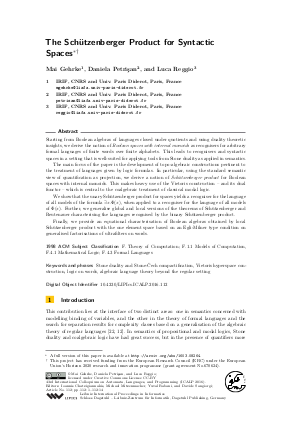The Schützenberger Product for Syntactic Spaces
Authors Mai Gehrke, Daniela Petrisan, Luca Reggio
-
Part of:
Volume:
43rd International Colloquium on Automata, Languages, and Programming (ICALP 2016)
Part of: Series: Leibniz International Proceedings in Informatics (LIPIcs)
Part of: Conference: International Colloquium on Automata, Languages, and Programming (ICALP) - License:
 Creative Commons Attribution 3.0 Unported license
Creative Commons Attribution 3.0 Unported license
- Publication Date: 2016-08-23
File

PDF
LIPIcs.ICALP.2016.112.pdf
- Filesize: 0.55 MB
- 14 pages
Document Identifiers
Subject Classification
Keywords
- Stone duality and Stone-Cech compactification
- Vietoris hyperspace construction
- logic on words
- algebraic language theory beyond the regular setting
Metrics
- Access Statistics
-
Total Accesses (updated on a weekly basis)
0Document
0Metadata
Abstract
Starting from Boolean algebras of languages closed under quotients and using duality theoretic insights, we derive the notion of Boolean spaces with internal monoids as recognisers for arbitrary formal languages of finite words over finite alphabets. This leads to recognisers and syntactic spaces in a setting that is well-suited for applying tools from Stone duality as applied in semantics. The main focus of the paper is the development of topo-algebraic constructions pertinent to the treatment of languages given by logic formulas. In particular, using the standard semantic view of quantification as projection, we derive a notion of Schützenberger product for Boolean spaces with internal monoids. This makes heavy use of the Vietoris construction - and its dual functor - which is central to the coalgebraic treatment of classical modal logic. We show that the unary Schützenberger product for spaces yields a recogniser for the language of all models of the formula EXISTS x.phi(x), when applied to a recogniser for the language of all models of phi(x). Further, we generalise global and local versions of the theorems of Schützenberger and Reutenauer characterising the languages recognised by the binary Schützenberger product. Finally, we provide an equational characterisation of Boolean algebras obtained by local Schützenberger product with the one element space based on an Egli-Milner type condition on generalised factorisations of ultrafilters on words.
Cite As Get BibTex
Mai Gehrke, Daniela Petrisan, and Luca Reggio. The Schützenberger Product for Syntactic Spaces. In 43rd International Colloquium on Automata, Languages, and Programming (ICALP 2016). Leibniz International Proceedings in Informatics (LIPIcs), Volume 55, pp. 112:1-112:14, Schloss Dagstuhl – Leibniz-Zentrum für Informatik (2016)
https://doi.org/10.4230/LIPIcs.ICALP.2016.112
BibTex
@InProceedings{gehrke_et_al:LIPIcs.ICALP.2016.112,
author = {Gehrke, Mai and Petrisan, Daniela and Reggio, Luca},
title = {{The Sch\"{u}tzenberger Product for Syntactic Spaces}},
booktitle = {43rd International Colloquium on Automata, Languages, and Programming (ICALP 2016)},
pages = {112:1--112:14},
series = {Leibniz International Proceedings in Informatics (LIPIcs)},
ISBN = {978-3-95977-013-2},
ISSN = {1868-8969},
year = {2016},
volume = {55},
editor = {Chatzigiannakis, Ioannis and Mitzenmacher, Michael and Rabani, Yuval and Sangiorgi, Davide},
publisher = {Schloss Dagstuhl -- Leibniz-Zentrum f{\"u}r Informatik},
address = {Dagstuhl, Germany},
URL = {https://drops.dagstuhl.de/entities/document/10.4230/LIPIcs.ICALP.2016.112},
URN = {urn:nbn:de:0030-drops-62474},
doi = {10.4230/LIPIcs.ICALP.2016.112},
annote = {Keywords: Stone duality and Stone-Cech compactification, Vietoris hyperspace construction, logic on words, algebraic language theory beyond the regular setting}
}
Author Details
References
-
J. Adámek, R. Myers, H. Urbat, and S. Milius. Varieties of languages in a category. In LICS, pages 414-425. IEEE, 2015.

-
F. Bonchi, M. Bonsangue, H. Hansen, P. Panangaden, J. Rutten, and A. Silva. Algebra-coalgebra duality in Brzozowski’s minimization algorithm. ACM Trans. Comput. Logic, 15(1):3:1-3:29, 2014.

-
M. Branco and J.-É. Pin. Equations defining the polynomial closure of a lattice of regular languages. In Albers et al, editor, ICALP 2009, volume 5556 of Lecture Notes In Computer Science, pages 115-126. Springer-Verlag, 2009.

- S. Czarnetzki and A. Krebs. Using duality in circuit complexity. arXiv, abs/1510.04849, 2015. To appear in LATA 2016. URL: http://arxiv.org/abs/1510.04849.
-
S. Eilenberg. Automata, languages, and machines. Vol. B. Academic Press, New York-London, 1976.

-
M. Gehrke. Stone duality, topological algebra, and recognition. J. Pure and Appl. Algebra, 2016.

-
M. Gehrke, S. Grigorieff, and J.-É. Pin. Duality and equational theory of regular languages. In Automata, languages and programming II, volume 5126 of Lecture Notes in Comput. Sci., pages 246-257. Springer, Berlin, 2008.

-
M. Gehrke, S. Grigorieff, and J.-É. Pin. A topological approach to recognition. In Automata, languages and programming II, volume 6199 of Lecture Notes in Comput. Sci., pages 151-162. Springer, Berlin, 2010.

-
M. Gehrke, A. Krebs, and J.-É. Pin. Ultrafilters on words for a fragment of logic. Theoret. Comput. Sci., 610(part A):37-58, 2016.

-
M. Gehrke, D. Petrişan, and L. Reggio. The Schützenberger product for syntactic spaces. arXiv, abs/1603.08264, 2016.

-
N. Hindman and D. Strauss. Algebra in the Stone-\v Cech compactification. de Gruyter, 2012.

-
A. Krebs, K.-J. Lange, and S. Reifferscheid. Characterizing TC⁰ in terms of infinite groups. Theory Comput. Syst., 40(4):303-325, 2007.

-
K. Kuratowski. Topology. Vol. I. Academic Press, New York-London; Państwowe Wydawnictwo Naukowe, Warsaw, 1966.

-
R. McNaughton and S. Papert. Counter-free automata. The M.I.T. Press, Cambridge, Mass.-London, 1971. With an appendix by William Henneman, M.I.T. Research Monograph, No. 65.

-
J.-É. Pin. Arbres et hierarchies de concatenation. In ICALP, volume 154 of Lecture Notes in Computer Science, pages 617-628. Springer, 1983.

-
J.-É. Pin. Algebraic tools for the concatenation product. Theoretical Computer Science, 292(1):317-342, 2003. Selected Papers in honor of Jean Berstel.

-
J.-É. Pin and P. Weil. Profinite semigroups, Malcev products, and identities. J. of Algebra, 182(3):604-626, 1996.

-
C. Reutenauer. Theoretical Computer Science 4th GI Conference: Aachen, chapter Sur les varietes de langages et de monoïdes, pages 260-265. Springer, 1979.

-
M.-P. Schützenberger. On finite monoids having only trivial subgroups. Information and Control, 8(2):190-194, 1965.

-
M. H. Stone. The theory of representations for Boolean algebras. Trans. Amer. Math. Soc., 40(1):37-111, 1936.

-
H. Straubing. A generalization of the Schützenberger product of finite monoids. Theoret. Comput. Sci., 13(2):137-150, 1981.

-
H. Straubing. Finite Automata, Formal Logic, and Circuit Complexity. Birkhauser, 1994.

-
B. Tilson. Categories as algebra: an essential ingredient in the theory of monoids. J. Pure Appl. Algebra, 48(1-2):83-198, 1987.

